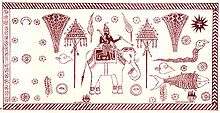Vaduge
Badugé and Vadugé are two ancestral family names used to date by Karava families of Sri Lanka. It denotes 'carpenter' in the Sinhalese language.


"However, historical evidence from India and Sri Lanka shows that these groups had formerly made up another important clan of the Karavas rather than a large body of carpenters. The Karáva family name Vedagé too is similarly misinterpreted now as ‘house of the physician’ whereas in the past it had denoted a person versed in the sacred Hindu Vedas and pronounced as Védagé.
The word Vaduga had been used both in India and Sri Lanka to distinguish persons and groups which had migrated to the south from the north. Accordingly, Kauravas, who migrated to South India from the north, had been called Kaura Vadugar in Tamil (Kurukula Charithaya I 48). Such nomenclature also justifies the observation of Hugh Neville that the Karáva of Ceylon and South India are undoubtedly a remnant of a northern race (Oriental Studies II 9).
References
- Kurukula Charithaya part I, Kurukula Véndar S. F. Weerasuriya, 1960, page 48
- Oriental Studies, Hugh Neville
- Queyroz Fr. The Temporal and Spiritual Conquest of Ceylaö
- Taylor W. Indian Historical Manuscripts, Vol II, Madras 1835
- Dharmabandhu T. S., 1962 Kaurava Vansa Katháva,
- Indian Historical Manuscripts, Taylor, vol. I,
- Kataragama, Paul Wirz,